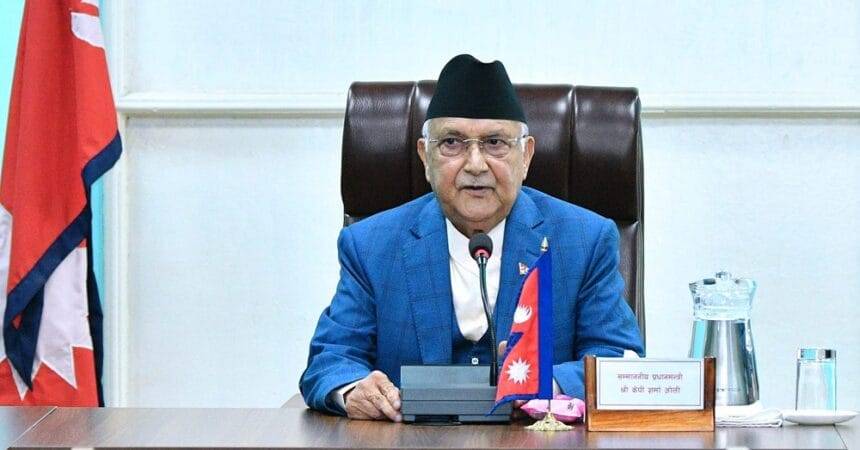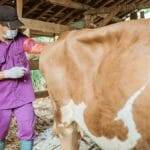Main Points In Hindi (मुख्य बातें – हिंदी में)
-
कृषि क्षेत्र का महत्व: प्रधानमंत्री केपी शर्मा ओली ने कृषि क्षेत्र को अर्थव्यवस्था का मुख्य हिस्सा बताया है, जिससे अधिकांश आबादी जुड़ी हुई है।
-
भुखमरी और गरीबी की चुनौती: उन्होंने कहा कि इसके बावजूद, कई लोग गरीबी और भुखमरी में जीने को मजबूर हैं, जबकि लगभग 62% परिवार कृषि में लगे हुए हैं।
-
आयात पर निर्भरता: नेपाल अपने भोजन के लिए आयात पर अत्यधिक निर्भर है, और कई परिवार गरीबी से जूझ रहे हैं, जिसका समाधान सरकार के प्रयासों के तहत किया जा रहा है।
-
आधुनिकीकरण और व्यावसायीकरण: कृषि उपज के उत्पादन और निर्यात को बढ़ाने के लिए कृषि मंत्रालय ने आधुनिकीकरण और व्यावसायीकरण के माध्यम से ठोस कार्यक्रम शुरू किया है।
- भविष्य के लिए खाद्य सुरक्षा योजनाएं: सभी नगर पालिकाओं में खाद्य भंडार स्थापित करने और बच्चों के कुपोषण को रोकने के लिए चर्चाएँ तथा योजनाएं बनाई जा रही हैं।
Main Points In English(मुख्य बातें – अंग्रेज़ी में)
Here are the main points from the provided text:
-
Importance of Agriculture: Prime Minister KP Sharma Oli highlighted that agriculture is a crucial part of Nepal’s economy, yet many people linked to it still face poverty and hunger.
-
Dependence on Food Imports: Despite around 62% of families being involved in agriculture, Nepal remains heavily reliant on food imports, which contributes to ongoing poverty issues.
-
Government Initiatives: The government is coordinating efforts through the Ministry of Agriculture and Livestock Development to modernize and commercialize the agricultural sector, aiming to enhance production and export.
-
Food Security Measures: Local level initiatives include establishing food storage facilities in all municipalities and developing a framework among relevant ministries to address full poverty alleviation strategies.
- Child Welfare Commitment: PM Oli emphasized that no child should be left alone in vulnerable situations, particularly on the streets, and that efforts will be made to prevent malnutrition among children.


Complete News In Hindi(पूरी खबर – हिंदी में)
टीआरएन ऑनलाइन द्वारा, काठमांडू, 16 अक्टूबर: प्रधानमंत्री केपी शर्मा ओली ने कहा है कि कृषि क्षेत्र अर्थव्यवस्था का मुख्य हिस्सा है।
44वें विश्व खाद्य दिवस के अवसर पर शुभकामनाएं देते हुए पीएम ओली ने कहा कि यह दुखद स्थिति है कि अधिकांश आबादी कृषि से जुड़ी होने के बावजूद अभी भी कई लोग गरीबी और भुखमरी में जीने को मजबूर हैं।
पीएम ओली ने कहा, “भले ही लगभग 62 फीसदी परिवार कृषि में लगे हुए हैं, हम भोजन के लिए आयात पर बहुत अधिक निर्भर हैं। नेपाल में कई परिवार गरीबी से जूझने को मजबूर हैं। यह दुख की बात है कि खेती योग्य होने के बावजूद देश में हाथ से काम करने वाले बहुत से नागरिक निम्न स्तर का जीवन जी रहे हैं, इसलिए वर्तमान सरकार इसे समाप्त करने का प्रयास कर रही है, अब भी, लगभग 13 प्रतिशत और 42 जिले खाद्य असुरक्षा के अधीन हैं यह।”
इसी तरह, उन्होंने कहा कि कृषि और पशुधन विकास मंत्रालय ने वित्त मंत्रालय और उद्योग, वाणिज्य और आपूर्ति मंत्री के साथ समन्वय में आधुनिकीकरण और व्यावसायीकरण के माध्यम से कृषि उपज के उत्पादन और निर्यात को बढ़ाने के लिए एक ठोस कार्यक्रम शुरू किया है। कृषि।
सभी नगर पालिकाओं में खाद्य भंडार स्थापित करने के लिए सभी स्थानीय स्तरों पर समन्वय और सहयोग किया जा रहा है, जबकि पूर्ण गरीबी को जल्द से जल्द कैसे खत्म किया जाए, इस पर संबंधित मंत्रालयों में एक तंत्र तैयार करके काम आगे बढ़ाया गया है।
पीएम ने कहा, ”मंत्रियों की कैबिनेट ने फैसला किया है कि सड़क पर बच्चों को असहाय अवस्था में अकेला छोड़ दिया जाएगा। भौगोलिक विविधता के बावजूद किसी भी बच्चे को मरने के लिए अकेला नहीं छोड़ा जाएगा और न ही कुपोषण का शिकार बनाया जाएगा।”
बुधवार को 44वां विश्व खाद्य दिवस बेहतर जीवन और बेहतर भविष्य के लिए भोजन का अधिकार के नारे के साथ मनाया जा रहा है।
यह खबर पढ़कर आपको कैसा लगा?
Complete News In English(पूरी खबर – अंग्रेज़ी में)
TRN Online, Kathmandu, October 16: Prime Minister KP Sharma Oli has stated that the agriculture sector is a crucial part of the economy.
While extending greetings on the occasion of the 44th World Food Day, PM Oli expressed sorrow over the fact that, despite a large portion of the population being involved in agriculture, many still live in poverty and hunger.
He remarked, “Although nearly 62% of families are engaged in agriculture, we are heavily reliant on food imports. Many families in Nepal are struggling with poverty. It is unfortunate that despite having arable land, many citizens who work in agriculture live at a low standard of life. Therefore, the current government is working to address this issue; however, about 13% of the population and 42 districts still face food insecurity.”
Furthermore, he mentioned that the Ministry of Agriculture and Livestock Development has launched a solid program to enhance agricultural production and export through modernization and commercialization, in coordination with the Finance Ministry and the Minister of Industry, Commerce, and Supplies.
Efforts are being made to establish food reserves in all municipalities, with cooperation from local levels, while a mechanism has been set up in the relevant ministries to focus on how to eradicate extreme poverty as soon as possible.
The Prime Minister stated, “The cabinet of ministers has decided that no child should be left helpless on the streets. Regardless of geographical diversity, no child should die alone or suffer from malnutrition.”
Wednesday’s observance of the 44th World Food Day focuses on the slogan of food rights for a better life and future.
What do you think about this news?








